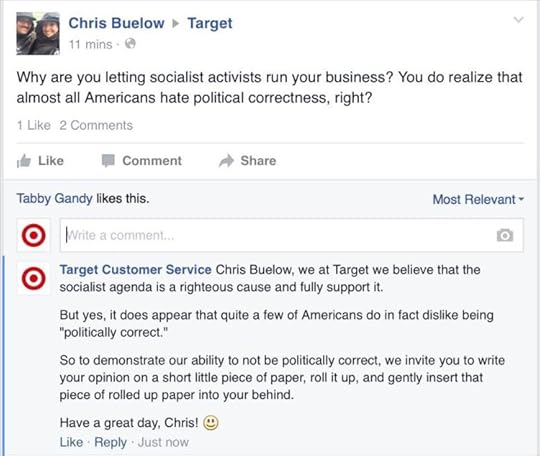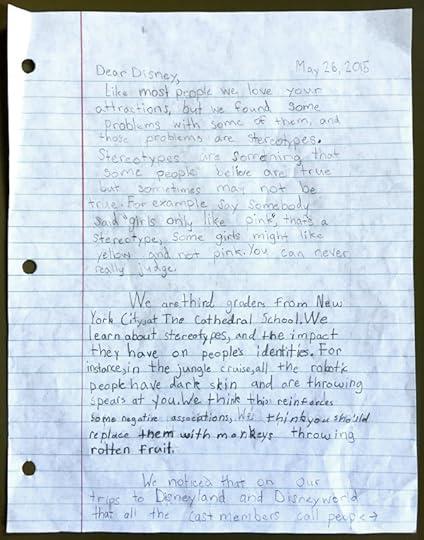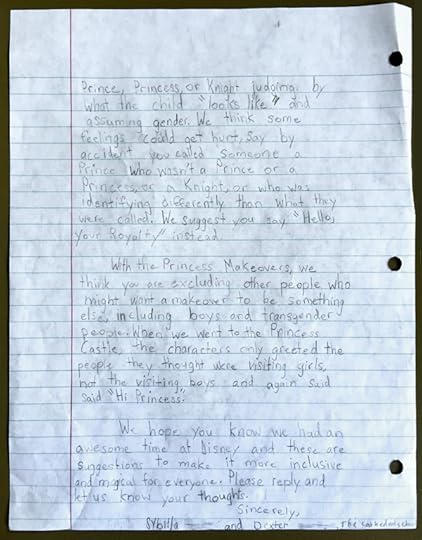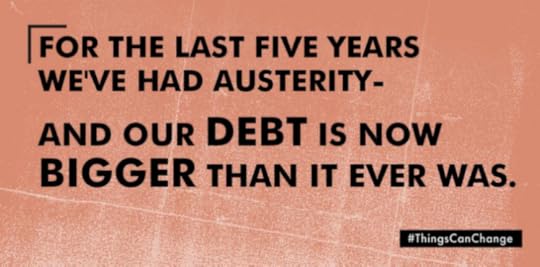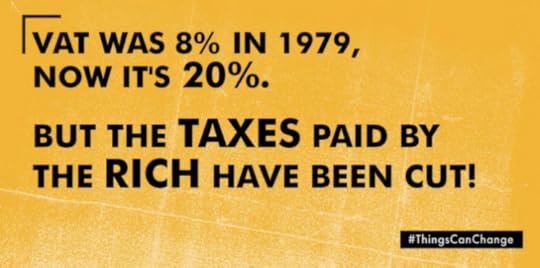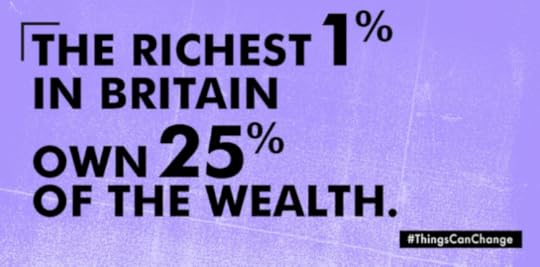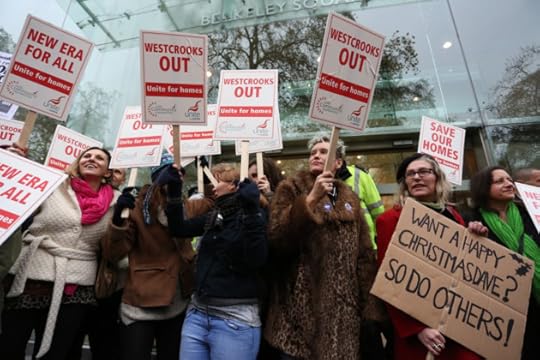K.P. Webster's Blog, page 16
August 17, 2015
Political Correctness Gone Marvellous
In June, two 9-year-old American kids sent a letter to the chairman of Walt Disney Parks complaining about some of the potentially damaging stereotypes they encountered at Disneyland and Disneyworld.
Here is an excerpt:
Like most people we love your attractions, but we found some problems with some of them and those problems are stereotypes … We are third graders from New York City at The Cathedral School. We learn about stereotypes, and the impact they have on people’s identities. For instance, in the jungle cruise, all the robotic people have dark skin and are throwing spears at you. We think this reinforces some negative associations, we think you should replace them with monkeys throwing rotten fruit.
I can imagine that a lot of people reading this letter might feel quite upset by it. I can imagine them shaking their heads and muttering darkly about the scourge of political correctness sticking its beak into all areas of society and stirring things up where they don’t need stirring. If they’re American themselves, they might also mention – whilst huffing and puffing in genuine disgust – something about goddamn liberals or whining SJWs or even the creeping pussification of America. This is because in America, a seemingly large and rather angry percentage of the population are frightened by ideas based on liberty, equality and social justice.
This was never more clearly and hilariously illustrated than last week when US department store Target announced that they would be phasing out some of the more unnecessary gender-based signs in their stores. This was primarily in response to the popularity of this tweet:
Facebook user Mike Melgaard saw Target’s announcement and, knowing how terribly afraid many American conservatives are, intuited that there might be something of a backlash. When that backlash began to manifest itself on Target’s Facebook page, he decided to pose as a representative of Target, setting up a fake customer service account and responding accordingly. The full story is here, and it’s wonderful.
Here are two of my personal favourites from his 16-hour reign of hilarity…
Hats off to Mike Melgaard!
Hats off also to Sybilla and Dexter, who wrote this to Disney but have yet to receive a reply:
And while we’re about it, if we’ve any hats left, let’s take them off to Stewart Lee, who here totally nails the whole debate in just two minutes…
Anon!
Filed under: ACTIVISM, EVOLUTIONARIES Tagged: facebook, political correctness, social media, Stewart Lee, Target, trolling, Walt Disney








August 14, 2015
The War on Consciousness
I’ve just watched and been pretty much blown away by this TED talk given by a man called Graham Hancock. It was recommended to me by a man called Gary. Gary was one of my fellow meditators at the Vipassana retreat I attended recently. When we were allowed to talk on the 10th day, I fell into conversation with Gary about the ayahuasca retreat he’d been on in the Peruvian rainforests. I had forgotten the very little I already knew about ayahuasca and after listening to his fascinating experience, determined to have one of my own. He recommended I look up a guy called Graham Hancock. I just got round to it this morning.
The talk below is extraordinary. It includes lots and lots of things I didn’t know, all of which tend to support the things I did know or at least fervently believe. Here is an excerpt:
We hate visionary states in this society. In our society, if we want to insult somebody, we call them a dreamer. In ancient societies that was praise. And we have erected huge apparatuses of armed bureaucracies who will invade our privacy, who will break down our doors, who will arrest us, who will send us to prison, sometimes for years, for possessing even small quantities of psilocybin or substances like DMT, whether in its smokeable form or in the ayahuasca brew, and yet ironically DMT is – we now know – a natural brain hormone. We all have it in our bodies and it’s just that its function remains unknown for lack of research.
And it’s not as though our society is opposed in principle to altered states of consciousness. I mean billions are being made by the unholy alliance of psychiatrists and big pharma in over-prescribing drugs to control so-called syndromes like depression, or attention deficit disorder in teenagers. And we have a love affair in our society with alcohol. We glorify this most boring of drugs despite the terrible consequences that it often has. And of course we love our stimulants: our tea, our coffee, our energy drinks, our sugar, and huge industries are built around these substances, which are valued because of the way they alter consciousness.
But what all these approved altered states of consciousness have in common is that none of them contradict or conflict with the basic state of consciousness valued by our society, which I would call “the alert problem-solving state of consciousness”, which is good for the more mundane aspects of science. It’s good for the prosecution of warfare, it’s good for commerce, it’s good for politics, but I think everybody realises that the promise of a society over-monopolistically based upon of this state of consciousness has proved hollow. And that this model is no longer working. That it’s broken in every possible sense that a model can be broken. And urgently we need to find something to replace it.
The vast problems of global pollution that have resulted from the single-minded pursuit of profit, the horrors of a nuclear proliferation, the spectre of hunger that millions every night go to bed starving. And we can’t even solve this problem despite our alert problem-solving state of consciousness. And look what’s happening in the Amazon – the lungs of our planet, this precious home of biodiversity – the old growth rainforest being cut down and replaced with soya bean farms so we can feed cattle so that we can all eat hamburgers. Only a truly insane global state of consciousness could allow such an abomination to occur … We can spend countless billions on warfare, on hatred, on fear, on suspicion, on division, but we can’t get together the collective effort to save the lungs of our planet.
And this is perhaps why shamans from the Amazon are now mounting a kind of reverse missionary activity. When I’ve asked shamans about the sickness of the West, they say it’s quite simple: “You guys have severed your connection with spirit. Unless you reconnect with spirit and do so soon, you’re going to bring the whole house of cards down around your heads and ours.” And rightly or wrongly they believe that ayahuasca is the remedy for that sickness.
What’s even more interesting about all this is that this particular TED talk was subsequently removed from the TED website. There is an enormous debate detailed here, which I hope to make the time to read soon, but the upshot is that TED felt that Hancock’s talk ‘was not rooted in proper scientific study’ (Nate Mook, TED). Although the conversation on that page is closed, the debate continues to rage, with Hancock and his advocates expressing concern that the reason his talk is not featured on TED’s website is more to do with the fact that it challenges mainstream thinking.
Bearing all this in mind, the final paragraph of his talk is particularly ironic.
And I stand here invoking the hard won right of freedom of speech to call for and demand another right to be recognised, and that is the right of adult sovereignty over consciousness. There’s a war on consciousness in our society and if we, as adults, are not allowed to make sovereign decisions about what to experience with our own consciousness while doing no harm to others, including the decision to use responsibly ancient and sacred visionary plants, then we cannot claim to be free in any way. And it’s useless for our society to go around the world imposing our form of democracy on others while we nourish this rot at the heart of society and we do not allow individual freedom over consciousness. It may even be that we are denying ourselves the next vital step in our own evolution by allowing this state of affairs to continue, and who knows, perhaps our immortal destiny as well.
Anyway, here’s the talk.
Now I’ve got to get on and make some money. Airfare to Peru is fucking expensive.
Filed under: CONSCIOUSNESS, EVOLUTIONARIES Tagged: ayahuasca, DMT, Graham Hancock, TED talks








August 12, 2015
The End of Capitalism
I saw this article entitled The End of Capitalism Has Begun on someone’s Facebook page a couple of weeks ago, but I’ve been busy and have only just got round to reading it.
And I’m very pleased that I did. And I recommend you do too. Here’s an excerpt:
The red flags and marching songs of Syriza during the Greek crisis, plus the expectation that the banks would be nationalised, revived briefly a 20th-century dream: the forced destruction of the market from above. For much of the 20th century this was how the left conceived the first stage of an economy beyond capitalism. The force would be applied by the working class, either at the ballot box or on the barricades. The lever would be the state. The opportunity would come through frequent episodes of economic collapse.
Instead over the past 25 years it has been the left’s project that has collapsed. The market destroyed the plan; individualism replaced collectivism and solidarity; the hugely expanded workforce of the world looks like a “proletariat”, but no longer thinks or behaves as it once did.
If you lived through all this, and disliked capitalism, it was traumatic. But in the process technology has created a new route out, which the remnants of the old left – and all other forces influenced by it – have either to embrace or die. Capitalism, it turns out, will not be abolished by forced-march techniques. It will be abolished by creating something more dynamic that exists, at first, almost unseen within the old system, but which will break through, reshaping the economy around new values and behaviours.
Here’s another:
Is it utopian to believe we’re on the verge of an evolution beyond capitalism? We live in a world in which gay men and women can marry, and in which contraception has, within the space of 50 years, made the average working-class woman freer than the craziest libertine of the Bloomsbury era. Why do we, then, find it so hard to imagine economic freedom?
It is the elites – cut off in their dark-limo world – whose project looks as forlorn as that of the millennial sects of the 19th century. The democracy of riot squads, corrupt politicians, magnate-controlled newspapers and the surveillance state looks as phoney and fragile as East Germany did 30 years ago.
All readings of human history have to allow for the possibility of a negative outcome. It haunts us in the zombie movie, the disaster movie, in the post-apocalytic wasteland of films such as The Road or Elysium. But why should we not form a picture of the ideal life, built out of abundant information, non-hierarchical work and the dissociation of work from wages?
If this kind of thing chimes with you as much as it chimes with me, I recommend you read the full article, and probably avoid the comments.
Now I’m off to buy some books to read.
Good day to you. And good luck.
Filed under: CAPITALISM, HOPE, JOURNALISM Tagged: Paul Mason, Postcapitalism








August 11, 2015
The Bic Debacle
Bic – the people who make the pens – have long been celebrated as a progressive company with a strong belief in gender equality and women’s rights. This actively pro-female stance has even been built into their products and advertising campaigns. Only Bic, for example, had the foresight in 2012 to develop a pen especially for women. The Bic for Her range of pastel-coloured pens with a thin barrel designed especially for chicks’ mitts proved an absolute triumph.
Women all over the world – along with effeminate men and small children – rejoiced at the arrival of a pen that their dainty, feeble, pointless little fingers could finally get to grips with. (These pens were later repackaged as Miss Bic, making women everywhere feel even more special.)
Then on Sunday, for South Africa’s Women’s Day 2015, in order ‘to celebrate women and the powerful contribution they make to society’, Bic came up with the above ad for their Facebook page, featuring the following slogan: ‘Look like a girl / Act like a lady / Think like a man / Work like a boss’.
Taking the feminists that comprise Bic’s marketing team completely by surprise, some women actually got quite angry at the idea of being told to look like girls and think like men, apparently not understanding that it would be entirely for their own good. For some, it was almost as if the idea of dressing like children in order – presumably – to impress and arouse the paedophile that lurks in every adult male, was somehow beneath them. Also, it turns out that some modern women – probably the same ones who think they can get away with using a man’s pen – seem perfectly content to think like the women they are.
Sadly, Bic have taken the ad down from their Facebook page and even issued an apology, blaming a poor woman called Sarah Taylor, who runs ‘a graphic and design company‘ in New South Wales. This isn’t really fair because, although Ms Taylor originally wrote the words on one of her barely literate blog posts in 2012, she wasn’t responsible for attaching them to Bic’s Women’s Day celebrations.
Reading the original blog post, it quickly becomes very clear that the written word is not Ms Taylor’s strong point, no matter, one suspects, whose pen she is using. In fact, she writes like a toddler. See:
If you are a well experienced woman then there is no reason to not be more confident about the work you produce, just take a step back remember who you are, be nice and still careful but speak up and proudly about your opinions, this will especially help because you will end up motivating them to greater standards.
and
Repeat after us: “Look like a girl, act like a lady, think like a man, work like a boss” … Take our Spicy advice on board and accomplish all you can with your skills, remember to acknowledge and speak up!
A couple of hours after their original apology went up – which included a link to Sarah Taylor’s blog and the words, ‘We can assure you that we meant it in the most empowering way possible and in no way derogatory towards women’ – it was taken down and replaced with another one which insisted, ‘we completely understand where we’ve gone wrong’.
I don’t think they do.

But then it’s easy to sneer here in the UK where, when it comes to our womenfolk, we are way ahead. Just look at the equal pay question, for example. Did you know that women in the UK are paid, on average, only around 20% less than men? Wow. A mere one fifth less. Plus there’s Woman’s Hour on Radio 4. That’s one whole hour dedicated to women on national radio EVERY SINGLE DAY. (Except Sunday.)
And they’ve got their own pens.
Phew.
What does a lady act like anyway?
Filed under: EQUALITY Tagged: bic, misogyny, South Africa, stationery








August 6, 2015
Small Group of People Spread Large Lashings of Joy Across Europe
Earlier today I was reading more about TTIP prior to the national Day of Action in a couple of weeks’ time, and it’s depressing and terrifying stuff.
Then, with my frustration increasing, I was distracted by a video a friend had posted on Facebook of something called the Eye Contact With Strangers experiment. Here it is here…
Then I read a little more about the experiment here. Then I went to the website of the people behind the experiment – The Liberators and their founder, Peter Sharp – and had a look at some of the other things they do. Like this…
I find it all extremely exciting.
Also, remember this?
It’s beautifully illustrated in the next couple of videos…
Turns out they’re currently doing a crowd-funded tour of Europe, five capitals in five weeks, with dancing and hugging and communing and meditating and goodness knows what else. I feel mildly gutted that I’ve only just heard about them now and that I’m not in London tomorrow for the London Tube Party, or on Saturday for the Blind Trust mass hug-off or on Sunday for the final day workshop and tearful farewell.
I’m in Cornwall. Which has its own delights.
I’ll catch up with them sooner or later though, for sure.
First Cornwall.
Then a crack at those TTIP blighters.
Now this…
Anon!
Filed under: EVOLUTIONARIES, JOY








August 4, 2015
The Dhamma Brothers
As you may or may not know, just over a month ago I took part in a 10-day Vipassana meditation retreat. I’m just about finished writing about it and if you’re interested to hear about my experience, I hope to put it up here tomorrow.
In the meantime, however, I thoroughly recommend you watch The Dhamma Brothers, a documentary about Vipassana meditation being introduced into a maximum security Alabama prison. The trailer is below. The full documentary is available on Netflix in the UK, or here on YouTube with Greek subtitles (and seemingly missing about 20 minutes) or, of course, in shops. Probably.
It’s very good.
It’s the way forward. Or at the very least, one of the ways forward.
Check it.
Filed under: COMPASSION, MEDITATION








August 3, 2015
Tina’s Story

Dad and Tina. All things must pass…
When I was a youth – a callow, craven, cowhearted thing of 15 or so – my father had a bright yellow budgie called Tina.
Why my father chose to christen this bright yellow budgie Tina is anyone’s guess, but in truth, it never struck me as a particularly unusual name. Whenever I tell people the story of Tina, however, the mention of her name always causes something of an incredulous kerfuffle, like he’d christened a baby girl Lumbago or Cockring. Anyhow, apparently foolish name aside, Tina was a delight.
Her cage door was open all day and she’d forever be out and about, flying hither and thither, chattering away, perched on picture frames and shitting on the faded Turner print we had hanging in the living room. Amongst her other tricks were tightrope walking (on a line of wool from my mother’s knitting), sharing apples with whomever happened to be eating one, and speaking the words ‘help me’ in moments of apparent distress.
We ignored her.
Unfortunately, six months or so into Tina’s short life, she developed a growth, on her back, where the wings meet. The growth grew, as growths do, and what began as a harmless if unpleasant-looking scab transmogrified into a veritable cigarette butt of what we could only hope was not cancer, but was just some weird budgie-scab. Of course, there was no internet in those days, so people without money for avian vets would just stumble around in the darkness like Homer Simpson in a room full of rakes.
After a while, however, the growth became so cumbersome that, in a moment of activity, it just dropped off. We were relieved. However, when it then began to grow back again, my father felt that the time had come to act. At that time in his life, he was attending some kind of day centre for the physically distressed once or twice a week. There he shared Tina’s symptoms with another attendee, one who claimed some level of expertise where caged birds were concerned.
What happened then was that my dad brought the birdman to our flat to see Tina, the birdman took one look at the scab on her back and nodded his head knowingly. Then, with my father’s consent, the birdman took Tina carefully into his hands and he strangled her.
Apparently, Tina’s last words were ‘help me’.
(To be fair, her only words were ‘help me’. And to be absolutely fair, they didn’t sound that much like ‘help me’ either. Although slightly more convincing than that dog that said ‘sausages’. And we didn’t have to manipulate Tina’s beak in order to get her to do it, so I suppose we come out of the whole thing smelling slightly less tawdry than Esther Rantzen.)
Anyway, that day when I got home from school, Tina was gone. (Down the rubbish chute).
Five years later, it was my dad’s turn. (Yep.)
Life eh?
Help me.
Filed under: FAMILY, REAL LIFE








May 27, 2015
We Need to Talk About Our Mothers (and Fathers)
Last night I watched We Need to Talk About Kevin. Apparently the book is much more distressing, but to be honest, I’m not sure I could handle it. The film was chilling enough. It made me think about my mum, who had an awful lot to put up with when her kids were growing up, although mostly that was down to my dad’s behaviour. I never stopped crying till I was 19, and my brother was so badly behaved that on occasion he had to have plates thrown at him – he also spent a year in borstal before he left home to become a full-time alcoholic – but my dad was the real shit of the family.
Anyway, he’s long dead now and on Saturday, me and my mum are off to Malaga for a week. Malaga! In Spain!
We’ve not been on holiday together since I was 12. And we’ve never been on holiday just the two of us. I know some of you could probably not imagine anything worse than going on holiday with your mum and I’m sorry for that. I feel very fortunate that we get along very well and that I’m really looking forward to it.
I am very fortunate.
And so is Alex Lyngaas, who wants nothing more than his mum to find someone to love. Check out her face at the end. ‘On internet?’
And while we’re on the subject, here’s JK Simmons…
He’s right, you know. If they’re still around, make the most of it. ‘Cause – unless you’re a tragic, borderline sociopathic figure – it’ll hurt like hell when they’re gone.
Anon!
x
Filed under: FAMILY, REAL LIFE








April 24, 2015
Friend Makes Friend Feel Loved
This is a nice story – a hella nice story even – about one young man doing something unconventional in order to show his best friend how much he loves him.
Read the full story here if you like, but the picture kind of covers it.
In the Independent’s misleadingly-headlined version of the story, someone a little homophobic-sounding got quite irate in the comments. ‘Firstly,’ they said, ‘it can hardly be classified as news.’
Hmmm.
Well, I don’t see why not. It happened. And fairly recently.
I suppose it’s not the usual kind of news, like George Osborne flapping about at HSBC’s teats or Katie Hopkins inciting genocide, but it’s definitely news. Good news, I should say. And I’m all for it.
Come on, human beings! More of this type of thing.
Filed under: ACCEPTANCE, COMPASSION, EQUALITY, HOPE








The Emperor’s New Clothes :: The Revolution Is in Progress
‘Everything you’re gonna hear about in this film you already know,’ says Russell Brand at the beginning of The Emperor’s New Clothes, the new documentary he’s made with Michael Winterbottom. ‘You might not know the exact figures, but you know the big issue. The rich are getting richer. Inequality is getting greater. But it doesn’t have to be like this. It can be different … Things can change. Things do change.’
The Emperor’s New Clothes is a great, infuriating and rousing film. One of its main strengths is that it discusses capitalism and more specifically, the 2008 banking crisis and its aftermath, removing all the deliberate obfuscation that exists around the subject and explaining simply and articulately exactly what happened and why. Consequently, it’s a film that has you simmering with righteous indignation and at the same time, desperate to do something about it. Crucially, it leaves you feeling positive.
Here are some of the facts and figures brought to light in the film – stuff you might not have known, or most probably have heard before but have probably forgotten because it’s just too galling to keep in your brain:
+ In the UK, we bailed out the banks to the tune of £133bn, which is more than £4,000 per taxpayer. In the US, they pumped in two and a half trillion dollars.
+ In Britain since the crash, bankers have paid themselves more than a hundred billion pounds in bonuses. Since the crash, that is – when they ripped us off and totally got away with it.
+ In 2010, the average pay of CEOs in big banks was £6.4m. Two years after the crash, that is. Two years after the whole banking system had been bailed out by the British taxpayer, back there in the midst of the so-called credit crunch, the bosses of the banks were still taking home 300 times the average UK wage.
+ A cleaner in your average bank would have to work 300 years to earn the same a CEO in the same building earns in a single year.
+ Last year Goldman Sachs bankers earned an average of £3m each. If the bankers each gave up one day of their pay, they could practically double the wages of all their cleaners.
+ Since the bailout, George Osborne has made £81bn worth of cuts. In the same period, £80bn worth of banker bonuses have been awarded. (These are the very same bankers, don’t forget, to whom we paid £133bn when they fucked everything up with their greed.)
+ In 2013, the Royal Bank of Scotland lost £8.24bn but still paid £588m in staff bonuses.
+ Higher and higher student loans are making further education impossible for many people. One medical student in the film is looking at a post-degree debt of £80,000.
+ The minimum wage was introduced in 1999. If it had increased at the same rate as bosses’ pay, it would now be £20 an hour. Instead it’s £6.70.
+ When Thatcher came to power, bosses of big companies in Britain used to earn ten times the salary of the average worker. Now they earn about 150 times more.
+ At Barclays, in 1979, the boss got £87,000 a year. In 2011, CEO Bob Diamond paid himself £6.3m, even though the company share price had dropped by 30% in the ten preceding years.
+ If the ordinary rate of pay for Lloyds workers had gone up at the same rate as the CEO over the past 35 years, the average worker would now be earning £900,000 a year.
+ For every billion pounds of benefit fraud, there are 9,000 prosecutions. For every billion pounds of income tax fraud, there are five prosecutions.
+ According to Oxfam, a bus with the 80 richest people in the world on it would contain more wealth than the collective assets then half the earth’s population.
+ 80% of the hedge fund industry is based in the Cayman Islands where there is no corporation tax and no income tax.
+ Non-doms – rich people who insist they live abroad and therefore don’t have to pay tax in the UK, such as Daily Mail owner Lord Rothermere, who lives in the UK – avoid (or if you prefer, steal) more than £4bn a year.
+ More than half of world trade passes on paper through tax havens. Half of all banking assets are held offshore. There are whole industries set up to avoid paying tax (or if you prefer, stealing).
+ In 2012, research estimated that the amount of personal wealth held offshore in order to avoid paying tax onshore (stealing) is between 21 and 32 trillion dollars. Imagine!
+ Before the free market revolution, the superrich were taxed at 98%. Now Rupert Murdoch has companies registered in tax havens all around the world and it’s estimated he pays 6% in tax. Six per fucking cent.
As Brand says at one point, if this stuff doesn’t make you angry enough to kick a pig into a ditch, then you’ve not understood it properly.
The film tracks the rise of free market fundamentalism, from Thatcher and Reagan adopting Milton Friedman’s neoliberal economic policies, to the wild corporate capital accumulation of the past few years. It manages to do this while maintaining a very light touch. Footage of demonstrations and riots and slithery bankers ignoring journalists is intercut with Brand narrating against a white backdrop, slightly Jesus…

For what shall it profit a man, if he gain the whole world, and suffer the loss of his soul?
…but not overly. If you let Brand’s ego put you off, then frankly, you’re probably not that interested in the issues.
One particularly galling sequence of the film focuses on the riots in 2011, and highlights the differences in how we, as a society, treat corporate criminals and how we, as a society, treat criminals who target property.
The figures speak for themselves. More than 1,200 people were jailed as a consequence of the riots, and their sentences added up to more than 1,800 years in prison. As for the bankers, who stole hundreds of billions of pounds, well, a few of them lost their jobs. But don’t worry. They found new ones.
A clip of David Cameron seemingly seeing the light and describing the bankers as ‘people showing indifference to right and wrong, people with a twisted moral code, people with a complete absence of self-restraint’ turns out to be a speech condemning looters who smashed up some stuff and stole trainers.
But, asks Brand, ‘How many bankers went to jail for ripping off their customers by selling £23bn of PPI which they didn’t need? Or what about Standard Chartered money laundering involving 60,000 legal transactions adding up to $250bn? Or HSBC’s money laundering? How many bankers will go to prison for the illegal rigging of the Libor interest rates, which controlled trillions of dollars of transactions? Or the latest crime of the bankers, the foreign exchange rate scandal? The banks have paid millions in fines, but what do fines matter to people who can print money? When are some bankers going to start going to prison?’
Although attempts to speak to the CEOs of various banks and Lord Rothermere are stymied, Brand does get various ex-bankers and economists on camera. Their conclusions are coldly authoritative. Yes, enormous crimes were committed, deliberately and with contempt aforethought, and yes, if there were any justice in the world, bankers would be punished and the profit motive would be entirely removed from the banking industry.
Although the filmmakers made every attempt to interview bosses from all of the major banks, none agreed to talk. Instead there is footage of bankers simply refusing to comment, and of Brand being rejected from plush foyers or attempting to embarrass bank bosses with megaphones and Michael Moore-style stunts.
Some of the most powerful scenes in the film, however, feature Brand talking to ordinary people who have been adversely affected by recent austerity cuts or by corporate gluttony more generally. People who have to work multiple jobs to scrabble together a living wage, or who can’t afford to send their kids to university, or who have had their healthcare cut, or who are being evicted from their homes by means of 400% rent-hikes.
And it is with this focus on ordinary people under capitalist duress where the film comes into its own and becomes a tool of empowerment. Brand’s message has always been not merely that everything is fucked and unfair, but that we can change it, and that all we really have to do to change it is to come together and demand change.
Crucially, there are plenty of examples in the film of where people have stood up to corporate concerns and have seen them back down, including the Hackney healthcare workers who fought pay cuts and redundancies, the Hovis workers who took on Premier Foods and the New Era Estate tenants who stood up to private landlords Richard Benyon and Westbrook Partners.
One of the New Era Estate women spells it out: ‘What’s really important is that we’re not just standing back and allowing it to happen. I think what’s so exciting about it is that people like us – just normal people – can actually make a stand. We did make a difference: the Benyon estates did pull out of the purchase of the [New Era] estates and now we’re just about doing the same to Westbrook….’
They did. Westbrook eventually backed down and the New Era Estate was sold to a small housing group committed to providing low-cost homes to Londoners.
Now some of the women involved in fighting their eviction are helping other communities who are similarly threatened in other parts of London.
One of the many common criticisms levelled at Brand is that he offers no alternatives. As it happens, this isn’t true. He frequently offers alternatives. It’s just that the people who criticise have not really been paying attention, and are probably not that interested in the first place. At the end of this film, a few basic concrete changes are outlined. ‘How about,’ says Brand,
…we make them bankers pay back that money we gave them? How about a financial transaction tax to stop all them gamblers in the city? How about a 90% income tax for the richest 1% of people? … 90% inheritance tax for anything over £1m … Stop tax avoidance! Everybody equal under the law … How about a living wage for everyone? Could we possibly break up billionaires’ monopolies? … No one should be able to own more than 49% of one newspaper. How about we change company law [to clamp down on tax avoidance]. All companies should have workers, consumers and members of the community represented on the board so they can be part of the conversation. All workers should have shares in the companies they work for. Bosses’ and workers’ pay should be related and decided upon by a cross-section of workers in the company. We need to give people the time and space to come together in communities, in shared enterprises. Change does happen, and it can happen quickly.’
If you don’t agree that the gargantuan canyon between rich and poor in this country is something that should be addressed and changed; if you don’t agree that community is more important than the individual and that people are more important than money, then fine. Go your merry way. Continue to deride Brand and those who support him. Continue to call him naïve, hypocritical, egomaniacal and whatever other profoundly hollow insults impress your short-sighted friends on social media, and have fun with that.
Meanwhile, for the rest of us, who are just utterly fed up with the inequality and the injustice that is part and parcel of free market fundamentalism, it’s time to get involved. Sitting at home voting once every five years is really not enough. It’s time to get organised. It’s time to protest. Fundamentally, it’s time to come together.

The Emperor’s New Clothes is released tonight, in some places. If it’s not near you, but you’d like to see it, you can go here and – if there are enough of you – you can make it so.
Make it so.
If you’re keen to get involved in other stuff that’s already going on, a decent place to start might be with The People’s Assembly.
Filed under: REVIEW Tagged: banking, capitalism, change, film, Michael Winterbottom, optimism, politics, protest, Russell Brand, The Emperor's New Clothes











